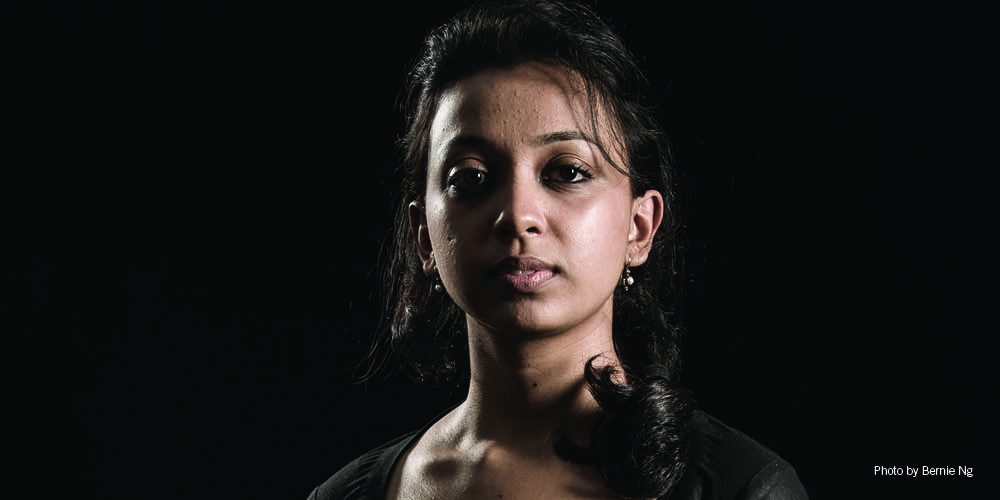
Since she was young, Namaha has always been inclined towards music and dance. To date, she has undergone seven years of training in ballet, 11 in singing, 13 in martial arts, and has been performing semi-classical dance on stage for over a decade.
A sociology graduate, Namaha’s passion for dance nevertheless persisted, and she is an experienced performer in Odissi - an Indian classical dance form. While pursuing dance, she chanced upon ITI.
To Namaha, theatre training was a challenge, as she was principally a dancer. However, voice training fascinated her. She felt that projecting emotions through dance and speech lent a different dimension to a performance - an empowering one.
After ITI, Namaha wants to continue work on this path and hopes to carve a strong individuality for herself in the process.
Tell us more about your dance days?
I was a full-time student, training in Odissi classical dance under Guru Daksha Mashruwalla in Mumbai. At the same time, I was also performing on stage in classical and semi-classical dance forms. I also had the opportunity to train other young Odissi students.
How did you discover ITI all the way from Mumbai?
I came to Singapore at my aunt Raka’s [ed’s note: Raka Maitra, founder of Chowk Productions] behest to perform in her dance drama The Blind Age, which was a collaborative effort with ITI students. During that time, I became privy to a few ITI classes; that really interested me, and spurred me to try out in ITI’s enrolment audition.
Now that it’s been almost three years since, can you recall your first day back in 2015?
My first day at ITI was one of the more momentous occasions in my life. For the first time I was to learn in another country with students from around the world. I recall entering Studio 1 and feeling as if I was among 150 people. It was undoubtedly overwhelming.
So what has the reality been like training to be a professional actor?
I feel that at ITI, I am on a global platform, being constantly exposed to completely new subjects, learnings and experiences. It’s akin to an arduous swimming expedition but the swim gets unpredictably tougher and I find myself being stretched physically, intellectually and emotionally.
At ITI, I am on a global platform, being constantly exposed to completely new subjects, learnings and experiences. It’s akin to an arduous swimming expedition but the swim gets unpredictably tougher and I find myself being stretched physically, intellectually and emotionally.
You mentioned the international, intercultural cohort you’re part of. Share with us more about that.
Interacting with new people is always enlightening, but here with students from around the world, the process is doubly fascinating. There is so much to know, but one invaluable discovery I’ve come to make, is that I need to know about my origins before appreciating others’.
Were there moments and classes here you’ll always remember years from now?
There have been several, but the most memorable is the sharing of songs in voice classes where our classmates taught us songs that they have cherished, with most in their respective mother tongues. We learnt the words, their meanings, the pronunciation, the tune, the significance. It was so moving — so culturally enriching.
How different are you as an actor now, after training?
The mode of experiential learning at ITI has helped me internalise a lot of teachings. I do find I am able to apply many of these processes beyond the class. I sense an elevated sensitivity by which I see more, I listen more and I speak more.
Has your ITI experience been all that you expected it to be?
Even when I started, I had anticipated that the course at ITI would be a tough one to do full justice to. Yet over time, I continued to find the bar getting progressively raised in every aspect, demanding a lot more from me in every way. It is a new surprise every day.
Any sage advice for those about to take your place as new students here?
I see prospective students and new students often being burdened by over-thinking and by underestimating their own potential. From my experience, I would suggest that they should not over-think, but just dive in wholeheartedly, because everything will fall into place sooner or later.
And any gratitude you’d like to shout out?
I feel a mere thank you is not enough to express my sincere gratitude. My list is quite long. It begins with my family, Raka, Sasi, my teachers, their family, my friends, the management at ITI, the cohort at ITI… plus there are many more, all of whom have played a crucial role in making this journey a memorable one and an eye-opening experience.
